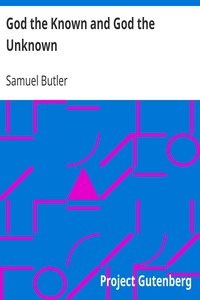God the Known and God the Unknown by Samuel Butler
"God the Known and God the Unknown" by Samuel Butler is a philosophical treatise written in the late 19th century. The text examines concepts of God, spirituality, and the nature of life from a perspective that intertwines scientific inquiry with theological questions. It presents an exploration of what we can know about God, differentiating between the personal God of traditional theology and a more expansive, impersonal conception of a life force or
unity that connects all living things. In the book, Butler discusses the inadequacies of both Pantheism and orthodox theism, arguing for a deeper understanding of God as a living entity whose essence pervades all life on Earth. He posits that humans, animals, and plants all share a common spirit and are thus part of a single, greater organism. Through this lens, Butler attempts to bridge the gap between the known (our tangible experiences of life) and the unknown (the vast, unknowable nature of God). He addresses how the characteristics of life can help us understand the divine, suggesting that rather than focusing solely on doctrine, individuals can encounter God through the richness of life itself. Ultimately, the text encourages readers to reconsider traditional views of divinity and adopt a holistic approach to existence. (This is an automatically generated summary.)
Read or download for free
| How to read | Url | Size | |||
|---|---|---|---|---|---|
| Read now! | https://www.gutenberg.org/ebooks/2513.html.images | 127 kB | |||
| EPUB3 (E-readers incl. Send-to-Kindle) | https://www.gutenberg.org/ebooks/2513.epub3.images | 121 kB | |||
| EPUB (older E-readers) | https://www.gutenberg.org/ebooks/2513.epub.images | 122 kB | |||
| EPUB (no images, older E-readers) | https://www.gutenberg.org/ebooks/2513.epub.noimages | 103 kB | |||
| Kindle | https://www.gutenberg.org/ebooks/2513.kf8.images | 221 kB | |||
| older Kindles | https://www.gutenberg.org/ebooks/2513.kindle.images | 207 kB | |||
| Plain Text UTF-8 | https://www.gutenberg.org/ebooks/2513.txt.utf-8 | 109 kB | |||
| Download HTML (zip) | https://www.gutenberg.org/cache/epub/2513/pg2513-h.zip | 121 kB | |||
| There may be more files related to this item. | |||||
Similar Books
About this eBook
| Author | Butler, Samuel, 1835-1902 |
|---|---|
| Title | God the Known and God the Unknown |
| Credits | Produced by Elliot S. Wheeler, and David Widger |
| Reading Level | Reading ease score: 50.0 (10th to 12th grade). Somewhat difficult to read. |
| Language | English |
| LoC Class | BL: Philosophy, Psychology, Religion: Religion: General, Miscellaneous and Atheism |
| Subject | Evolution |
| Subject | God |
| Category | Text |
| EBook-No. | 2513 |
| Release Date | Feb 1, 2001 |
| Most Recently Updated | Feb 1, 2013 |
| Copyright Status | Public domain in the USA. |
| Downloads | 341 downloads in the last 30 days. |
| Project Gutenberg eBooks are always free! | |

